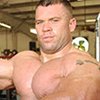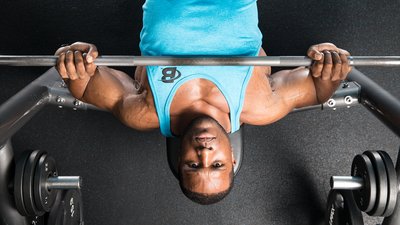Powerlifting for Beginners | Nutrition for Powerlifters | Powerlifting Training for Women | Powerlifting Meet Prep | Essential Powerlifting Gear
Making the plunge from gym bro to competitive powerlifter can be hard. Or it can be easy. It all depends how you prepare for competition. Yes, to compete successfully, you must be able to lift some major poundage. But, there's more to it than that: You need to know the rules of the game.
Here are seven ways aspiring powerlifters can prepare themselves for more success and fewer surprises at their first—or next—powerlifting meet.
1. Know Your Federation's Rules
What you may not know: There are as many powerlifting federations as there are blends of whiskey at an Irish pub. Most share some universal rules, but many have rules unique to their own organizations. Not knowing each federation's specific rules about squat depth, commands in the bench press, allowable foot wear—even who is allowed in the warm-up room—can sabotage even the best lifts.
What you need to know: Before heading to a competition, be aware of what that meet will consider rule infractions. Any federation worth competing in has its rulebook online. Read it carefully. If you have questions, contact that meet's director, federation president, or both ahead of time to make sure you understand what you can and can't do.
2. Prep for Competitive Squats, Not Gym Squats
What you may not know: It's all in the details. High squats might get you likes on Instagram, but they'll get you red lights on a platform. Wrapping your knees can add pounds to your squat, but totally change the groove if you're not used to them. Using a monolift can conserve energy in practice, but if you can't use them in competition (in some you can, in others you can't), don't use them in practice.
What you need to know: Match the way you practice to the way you'll compete. Just about every federation requires you to squat below parallel. Don't wait until you step on the platform to find that out. If you're going to compete in wraps, start using them 6-8 weeks out to get used to them. If you plan on using a monolift in a meet, make sure it's allowed, and then practice with it. And if you're going to walk out your squat, practice setting up the same way every time. While you're at it, start practicing with the specific commands that federation uses to complete a squat and, if possible, train with the squat bar that federation uses.

3. Bench Press 101: Don't Jump Commands
What you may not know: It's not unusual to hear lifters complain about having to do a long pause at the bottom of the bench press at some meets. And more than one bench presser has been dinged for beating a "start" command on the way down or a "rack" command after locking out the weight.
What you need to know: The way to get to Carnegie Hall is practice, practice, practice, right? Bench pressing in a powerlifting event is no different. Practice to the competition standards of each event and problems should be few and far between. When in doubt, hold the commands longer.
4. Get Ready for Strapless Deadlifting
What you may not know: You're not allowed to usestraps in competition. Period. Training with straps will mask a weak grip—a mask that'll get ripped off when it's just you and the bar. Also, in competition you must complete deadlifts by standing fully erect. Don't lean too far back. If you do, you strain your back muscles and unlock your knees, which is a clear rules violation. Some newbies don't fully lock out their lifts in training, then wonder why they get red lights at a meet. And, hell yes, deadlift bars can help you lift more, but they can also feel weird the first time you use one.
What you need to know: Train deadlifts without straps. If your grip is your weak link, learn how to grip your deadlift like a vise. Train by doing your deadlifts to a fully erect position and instead of just dropping the weight, have someone give you a down command so you can practice controlling the weight on the way down. Mastering a deadlift bar isn't rocket science, but there can be a small learning curve. Find a gym that has one and try it before your meet. And don't forget to wait for the down command and then control the bar all the way down after locking out. It's understandable that some lifters get excited and just drop the barbell. Don't be one of them.
5. See a Meet Up Close And Personal
What you may not know: You can read all the powerlifting articles you can find and spend hours on YouTube watching powerlifting meets, but it's not the same as going to a meet!
What you need to know: If at all possible, attend a powerlifting meet ahead of time. In a perfect world, you'll be able to go to a meet hosted by the federation you'll be competing in, but any meet is better than no meet at all. Powerlifting meets have a distinct feel. Experience that feeling before you compete.

6. Get Solid Feedback Before The Meet
What you may not know: Training with a bunch of "yes men" or an overly-optimistic coach will feel good in training, but can lead to a complete disaster come meet day. On the other hand, you don't want a pair of overly-critical eyes hindering your progress. Nothing destroys your confidence like having a coach make you squat to an unrealistic depth.
What you need to know: Find an experienced coach or training partner who can help you get dialed in for your meet the right way. Want to make sure you're doing it right? Video your lifts. Cameras don't lie. Your best friend in meet prep is honesty, and there's nothing more honest than the way you look on film or feedback from a coach or trainer you trust to give it to you straight.
7. Save Your Best for the Platform
What you may not know: Every set and rep you do is not going to be a PR. Grinding out an 8-second, rounded-back deadlift nine days out might feel like progress, but this type of overly ambitious training will have serious consequences come meet day.
What you need to know: Training is for building strength: Powerlifting meets are for demonstrating it! Give it your all at the meet, not when you prep for it.

